11 Bible Verses on Reaping and Sowing
Autumn is traditionally a time for harvest, so this post will focus on sowing and reaping, or harvesting. The Bible has a lot to say about these activities from both a spiritual standpoint and a natural point of view.

Contents
Reaping and Sowing in the Bible
As you probably know, Jesus liked to speak in metaphors. The parables He told about sowing and reaping were highly relatable to the people of His day because harvesting was a well-known and necessary part of life during His time. Most people had to sow and/or reap something in order to feed themselves and their families. In addition to Jesus’ parables, there are many scriptures about harvesting in general for this same reason.
Today, however, sowing and reaping are merely concepts to most of us, requiring us to spend a little more time considering these verses. The majority of us living in modern times haven’t been involved in much actual harvesting of crops. But one thing most of us do know is if we sow tomatoes we will reap tomatoes. If we sow cucumbers, we will harvest cucumbers, and so on; so we can easily use this analogy to begin our contemplation about planting and harvesting.
Speaking of reaping and sowing, have you ever seen the movie Second Hand Lions? At one point, a traveling salesman comes to their house and sells them seeds to plant a garden of a variety of crops, or so they think. Watch this video clip to see how their garden turns out…
So they thought they were planting beans, squash, tomatoes, potatoes, lettuce, sweet potatoes, carrots, beets, bok choy, and corn. But what happened is they only grew corn because they had unwittingly only planted corn.
This actually happened to me last summer. I was certain I had planted tomato seeds and bell pepper seeds. But when the first true leaves came out, I could clearly see that they were all tomatoes. Too bad, because I don’t like tomatoes, but I really like bell peppers. So disappointing! LOL!
Bible Verses on Reaping and Sowing
It’s a funny situation, but there’s a more serious point to take from it. We reap what we sow. Not only is it true in the physical sense of gardening but also in a more general sense. Our actions and words can be seen as seeds, and it can be said that they lead to a harvest of consequences. These consequences can be either good (righteousness) or bad (sin) depending on the seeds that were planted. Let’s look at some Bible verses about reaping what you sow so we can better understand this concept.
“Don’t be misled – you cannot mock the justice of God. You will always harvest what you plant. Those who live only to satisfy their own sinful nature will harvest decay and death from that sinful nature. But those who live to please the Spirit will harvest everlasting life from the Spirit.” Galatians 6:7-8
Figuratively speaking, this means that if we sow love, we will harvest love. If we sow seeds of kindness, we will harvest kindness. If we sow generosity and contentment, we will harvest plenty.
“So let us not grow weary of doing what is good, for at just the right time we will reap a harvest of blessing if we don’t give up.” Galatians 6:9
“And the seeds that fell on the good soil represent honest, good-hearted people who hear God’s word, cling to it, and patiently produce a huge harvest.” Luke 8:15
“For God is the one who provides seed for the farmer and then bread to eat. In the same way, He will provide and increase your resources and then produce a great harvest of generosity in you.” 2 Corinthians 9:10
“Peacemakers who sow in peace reap a harvest of righteousness.” James 3:18
On the other hand, if we sow mean seeds, we will harvest cruelty. If we sow hate, we will harvest hate. And if we sow seeds of greed, we will eventually see a harvest of lack. And the ultimate harvest of sin is death.
“My experience shows that those who plant trouble and cultivate evil will harvest the same.” Job 4:8
“Those who plant injustice will harvest disaster, and their reign of terror will come to an end.” Proverbs 22:8
“When we were controlled by our old nature, sinful desires were at work within us, and the law aroused these evil desires that produced a harvest of sinful deeds, resulting in death.” Romans 7:5
Look around at some of what you’re “harvesting” right now. Is it good, life-giving fruit? Or is it bad soul-sucking thorns?
Sowing What You Want to Reap
In light of the answer to the last question, think about what the seeds of those things might have looked like, and adjust your sowing as necessary to bring about the harvest you desire. Ask yourself what you want to harvest in the future. In doing so, you can more easily plan your time of sowing.
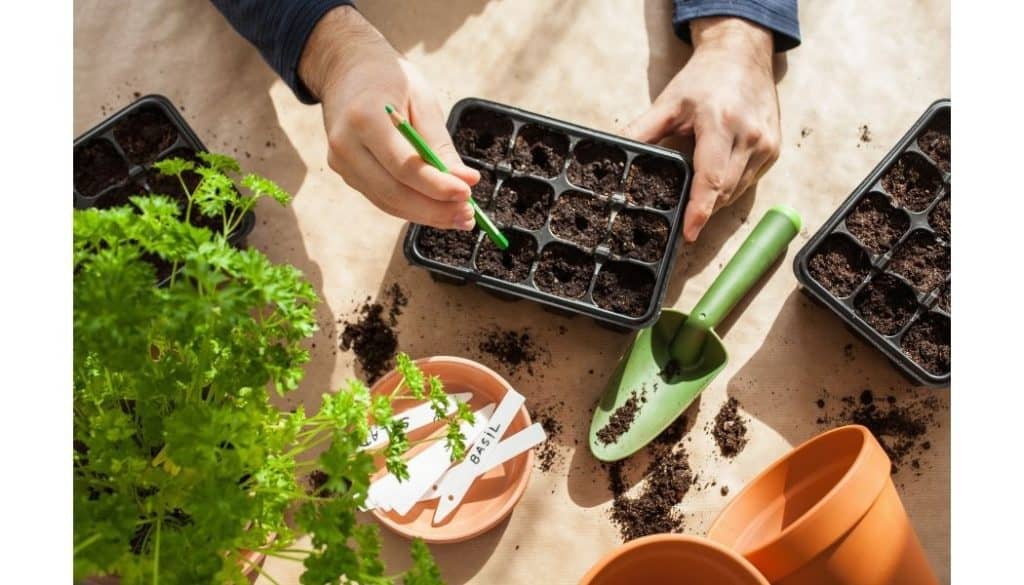
If you want to harvest contentment, sow seeds of gratitude. If you want to harvest peace, sow seeds of gentleness, kindness, and love.
On the flip side, we must be careful to not expect a harvest of something we haven’t sown; a lesson hard-learned by the farmers in the movie clip. If something is growing that we weren’t expecting or we were expecting to see a harvest of something but we aren’t, it could be that the seeds we planted weren’t the right ones after all.
“We don’t always realize what seeds have been planted until we see what’s growing from the seeds. If we are growing something we don’t want to harvest, we must stop sowing those seeds and switch to sowing seeds for the fruit we do want.”
Coren Millikan – CatchingCourage.blog
It’s also important to note that it is possible to get stuck in a season where we aren’t sowing any seeds at all. Now, we know from Ecclesiastes 3:1 that there is a time for everything, and that there are times when we don’t have the resources to sow at all. But during these seasons we should be careful to tend the garden full of seeds we have already sown.
Then once we again have the necessary resources, we should begin to sow seeds again. Otherwise, we might look out to see empty fields come harvest time, reflecting a lack of spiritual discipline in our lives.
“Sluggards do not plow in season, so at harvest time they look but find nothing.” Proverbs 20:4
Tending the Garden
In order to have a bountiful harvest, we must also tend the garden. In the natural world, this means watering the seeds and seedlings and pulling out weeds that might be stealing nutrients or sunlight from the plants we want to cultivate.
In the spiritual world, this means continually making sure our seeds (or virtues) are taking root and growing and not being overtaken by weeds, or undesirable character traits.
In fact, this is one of the ways Satan works against the work of God in our hearts. As soon as he sees a good thing taking root in our lives, he wants it out. So he plants weed seeds to choke out the good we are cultivating.
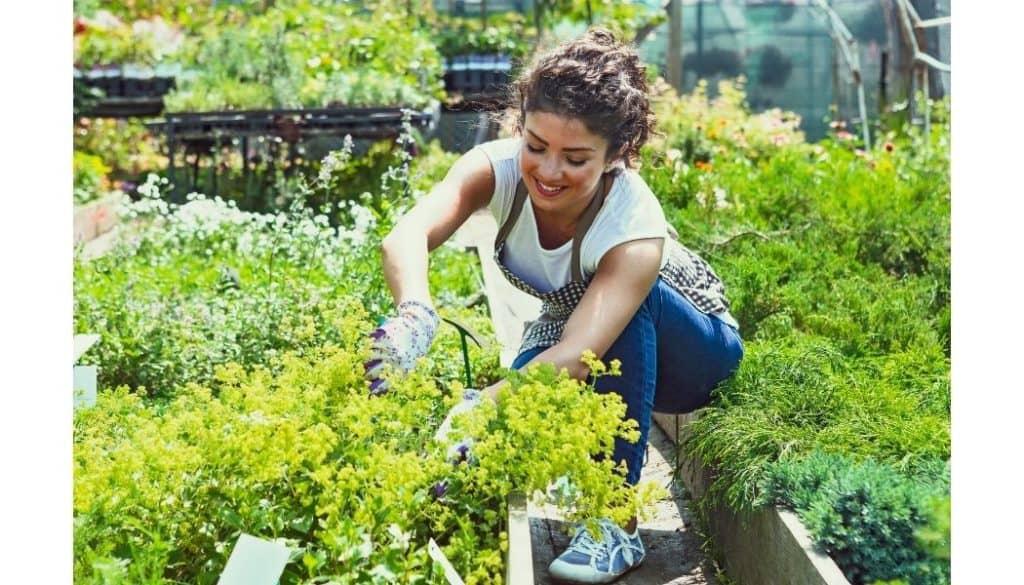
Going back to the last example, if we have been working to plant seeds of contentment, we might see weeds of covetousness sprouting up. Or if we’ve planted seeds of peace, Satan might up the chaos level around us to chase away any peace we might have cultivated from our time planting peace seeds.
“When the wheat sprouted and formed heads, then the weeds also appeared. The owner’s servants came to him and said, ‘Sir, didn’t you sow good seed in your field? Where, then, did the weeds come from?’ ‘An enemy did this,’ he replied…” Matthew 13:26-28a
It’s so important to be continually taking stock of our gardens. By doing so we make sure we are growing what we want to be growing so that we can eventually harvest things of God and not things of the world.
“He answered, ‘The one who sowed the good seed is the Son of Man. The field is the world, and the good seed stands for the people of the kingdom. The weeds are people of the evil one, and the enemy who sows them is the devil. The harvest is at the end of the age, and the harvesters are angels.” Matthew 13:37-39
Below is a cheat sheet for sowing what you want to reap. Click here to print it as is. Click here to print it without a background if you want to print it on your own pretty paper. 🙂
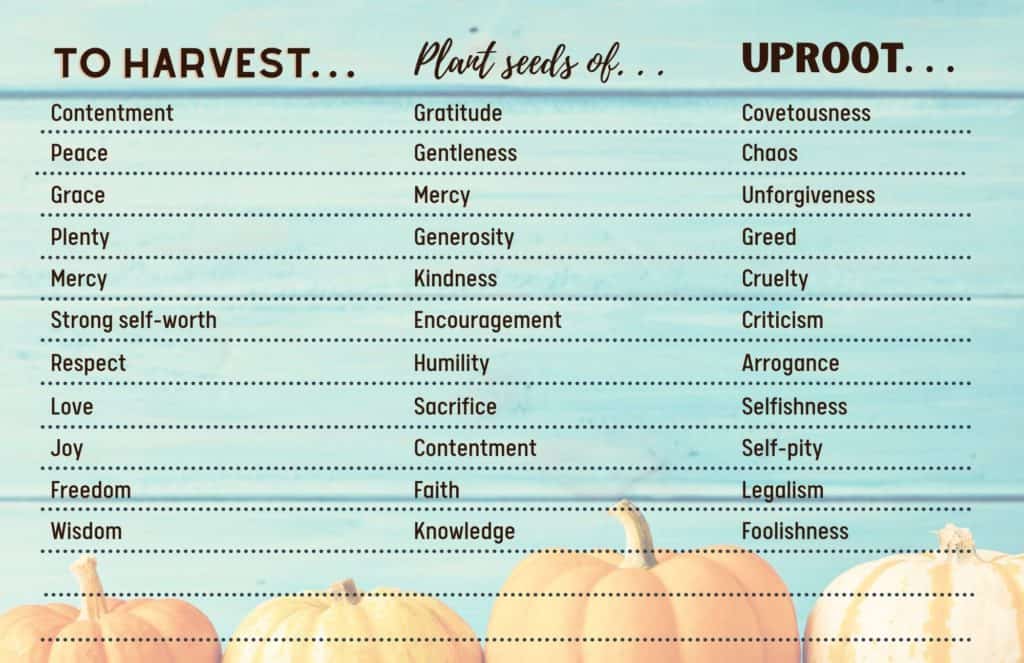
Sowing and Reaping Summary
Sowing and harvesting seeds of righteousness isn’t easy, but with the Holy Spirit’s help, it is more than possible. Just like a farmer wouldn’t plow and plant and harvest his crops alone, we don’t have to plant and harvest our spiritual crops alone.
Godly friends and family members come alongside us, and we all work together to cultivate righteousness in this life. And the “Holy Spirit will teach you all things and will remind you of everything [Jesus] has said.” (John 14:26) Through sowing and harvesting righteousness in this way, we “accumulate a store of” treasures in Heaven and live a life that shows the world the character of Jesus.
Points to remember:
- We reap what we sow.
- We won’t reap a harvest of things we don’t sow.
- Being aware of the things we want to harvest and don’t want to harvest allows us to plant the right seeds at the right times.
- Being aware of weeds the devil and his cohorts might be planting gives us a chance to pull them up before they become unmanageable.
I hope this post has helped you think about harvesting from a spiritual perspective. To keep it front of mind, I have created this phone background with one of my favorite harvest Bible verses. Click here to download it for free!
What’s your favorite harvest-time scripture? Comment below and let us know!
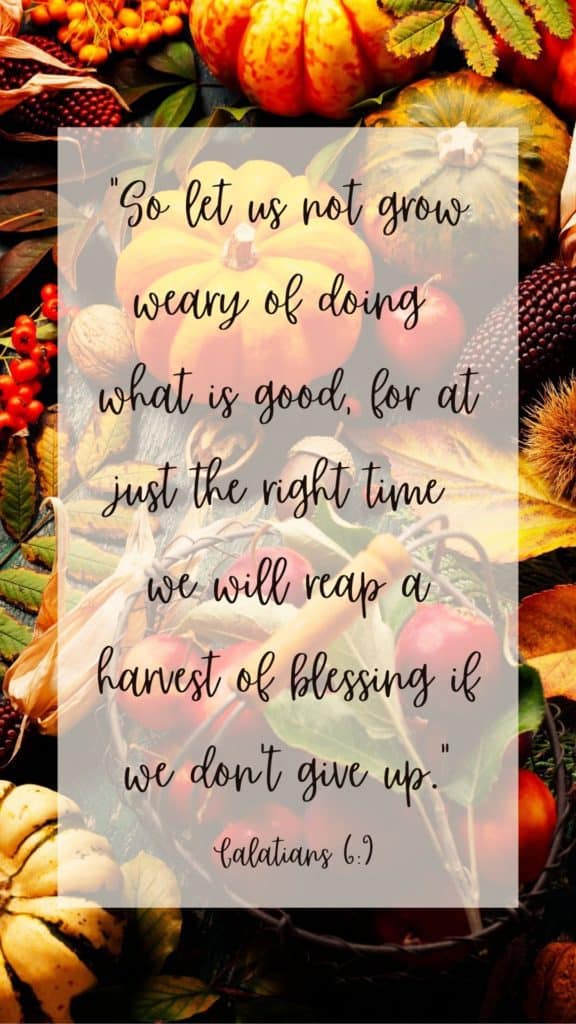
Catch ya later,




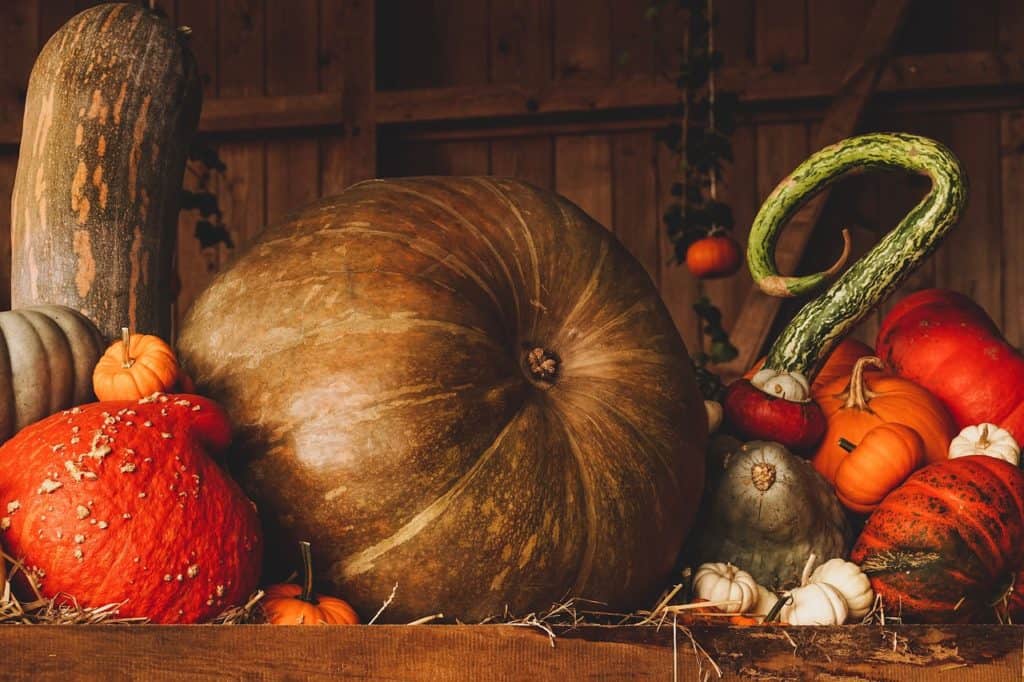



One Comment
Jonathan Srock
This is such a wonderful reminder of what the Bible tells us. I started thinking about all the passages about fruit, sowing and reaping, and all of the harvest festivals of Israel. Thanks!